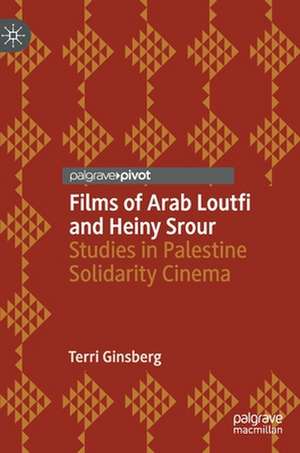Films of Arab Loutfi and Heiny Srour: Studies in Palestine Solidarity Cinema: Palgrave Studies in Arab Cinema
Autor Terri Ginsbergen Limba Engleză Hardback – 16 noi 2021
Preț: 483.55 lei
Nou
Puncte Express: 725
Preț estimativ în valută:
92.52€ • 96.95$ • 76.49£
92.52€ • 96.95$ • 76.49£
Carte tipărită la comandă
Livrare economică 11-25 aprilie
Preluare comenzi: 021 569.72.76
Specificații
ISBN-13: 9783030853532
ISBN-10: 3030853535
Pagini: 139
Ilustrații: XIII, 107 p. 11 illus., 7 illus. in color.
Dimensiuni: 148 x 210 mm
Greutate: 0.32 kg
Ediția:1st ed. 2021
Editura: Springer International Publishing
Colecția Palgrave Pivot
Seria Palgrave Studies in Arab Cinema
Locul publicării:Cham, Switzerland
ISBN-10: 3030853535
Pagini: 139
Ilustrații: XIII, 107 p. 11 illus., 7 illus. in color.
Dimensiuni: 148 x 210 mm
Greutate: 0.32 kg
Ediția:1st ed. 2021
Editura: Springer International Publishing
Colecția Palgrave Pivot
Seria Palgrave Studies in Arab Cinema
Locul publicării:Cham, Switzerland
Cuprins
1. Introduction.- 2. Feminist Auratics and the Radical (Re)Envisioning of Revolutionary Militancy.- 3. Trauma Critiques the Cinematic Confessional.- 4. Conclusion.
Notă biografică
Terri Ginsberg is assistant professor of film and media at Concordia University in Montréal. She is the author of Visualizing the Palestinian Struggle and Holocaust Film: The Political Aesthetics of Ideology; co-author of Historical Dictionary of Middle Eastern Cinema; and co-editor of Cinema of the Arab World and A Companion to German Cinema. She is a founding member of the Middle East Moving Image Collective (MEMIC). Her forthcoming edited collection looks at the governmentalization of international film education.
Textul de pe ultima copertă
“In this penetrating volume, Terri Ginsberg provides us with an example of film scholarship at its most radical. Giving fresh and detailed attention to the Palestine solidarity films of two Arab women directors, Ginsberg challenges us to rethink some of our most basic political assumptions, calling into question multiple disciplines, fields of inquiry, and epistemological frameworks. This book does not just describe decolonization; it partakes in it.”
—Greg Burris, Associate Professor of Media Studies, American University of Beirut; author of The Palestinian Idea: Film, Media, and the Radical Imagination
This book places long overdue focus on the Palestine solidarity films of two important Arab women directors whose cinematic works have never received due attention within the scholarly literature or the cultural public sphere. Through an analysis that situates these largely overlooked films within the matrix of an anti-Zionist critique of cinematic ontology,this book offers a materialist feminist appreciation of their political aesthetics while critiquing the ideological enabling conditions of their academic absenting. The study of these daring films fosters a much-needed, sustained understanding of the meaning and significance of Palestine solidarity filmmaking for and within the Arab world.
Terri Ginsberg is assistant professor of film and media at Concordia University in Montréal. She is the author of Visualizing the Palestinian Struggle and Holocaust Film: The Political Aesthetics of Ideology; co-author of Historical Dictionary of Middle Eastern Cinema; and co-editor of Cinema of the Arab World and A Companion to German Cinema. She is a founding member of the Middle East Moving Image Collective (MEMIC). Her forthcoming edited collection looks at the governmentalization of international film education.
This book places long overdue focus on the Palestine solidarity films of two important Arab women directors whose cinematic works have never received due attention within the scholarly literature or the cultural public sphere. Through an analysis that situates these largely overlooked films within the matrix of an anti-Zionist critique of cinematic ontology,this book offers a materialist feminist appreciation of their political aesthetics while critiquing the ideological enabling conditions of their academic absenting. The study of these daring films fosters a much-needed, sustained understanding of the meaning and significance of Palestine solidarity filmmaking for and within the Arab world.
Terri Ginsberg is assistant professor of film and media at Concordia University in Montréal. She is the author of Visualizing the Palestinian Struggle and Holocaust Film: The Political Aesthetics of Ideology; co-author of Historical Dictionary of Middle Eastern Cinema; and co-editor of Cinema of the Arab World and A Companion to German Cinema. She is a founding member of the Middle East Moving Image Collective (MEMIC). Her forthcoming edited collection looks at the governmentalization of international film education.
Caracteristici
Analyzes two Palestine solidarity films directed by Arab Loutfi and two by Heiny Srour Engages the subject films in the context of public and scholarly debates concerning Zionism and film aesthetics Theorizes these films at the social ontological nexus of directorial positionality and cinematic structuration









